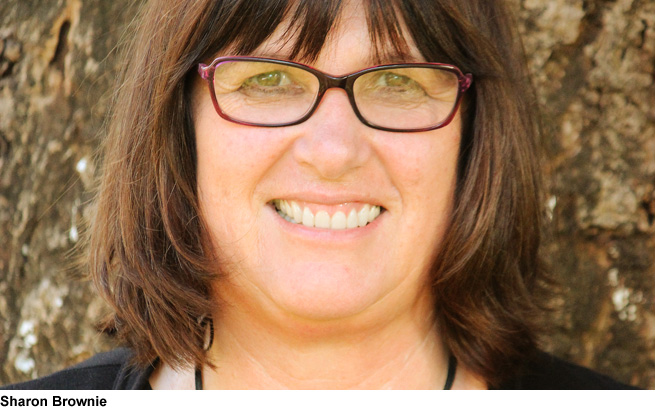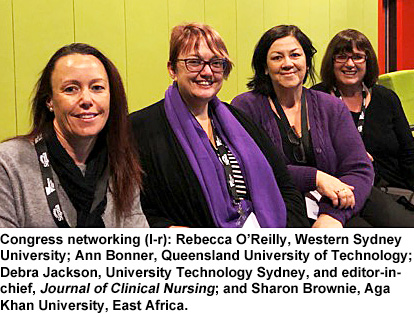Twenty million nurses around the globe are a cadre for change.

Nurses have substantial ability to influence health and socioeconomic-related policy and practice and to exercise that power on a global scale.
With close to 20 million nurses working across every level of the healthcare system, nursing is the world’s largest healthcare profession. And with nurses from more than 40 countries giving direct insight to this extraordinary diversity and talent pool, there is a real buzz this week at Sigma’s 29th International Nursing Research Congress in Melbourne.
 As a profession, nurses are closest to the point of care—at the bedside, in homes, and in communities. Nurses bear firsthand witness to the influences and impact of social, environmental, economic, and political factors on the health of families and communities. Subsequently, nurses have substantial ability to influence health and socioeconomic-related policy and practice and to exercise that power on a global scale. Stated succinctly, as the single largest cadre of healthcare providers, nurses have the most capacity to advocate and influence change.
As a profession, nurses are closest to the point of care—at the bedside, in homes, and in communities. Nurses bear firsthand witness to the influences and impact of social, environmental, economic, and political factors on the health of families and communities. Subsequently, nurses have substantial ability to influence health and socioeconomic-related policy and practice and to exercise that power on a global scale. Stated succinctly, as the single largest cadre of healthcare providers, nurses have the most capacity to advocate and influence change.
Need and opportunity for nursing leadership
As Debra Thoms, RN, RM, FACN (DLF), FACHSM (Hon), chief nursing and midwifery officer of Australia, emphasized in congress’s opening plenary session, never before has there been such need or opportunity for nurses to show leadership and surpass current practice limits. Noting that health costs in Australia are rising faster than the country’s gross domestic product and that costs are doubling every 10 years, she spoke of the need for new roles and outlined efforts to better define the scope of advanced practice roles in ways that enable nurses to increase their contributions to healthcare.
Her message was clear: Nursing has enormous contributions to make in achieving universal health coverage. To maximize those contributions, nurses must be allowed to practice to their full potential and be engaged in research and publication.
21st-century health challenges
Engagement in research is a critical component of effective nursing leadership. Much is written about aging populations, chronic disease, and complex comorbidities in the Western world with well-documented evidence about the disproportionate escalation of these challenges in low socioeconomic communities and in low- and middle-income countries (LMICs). In these settings, noncommunicable disease (NCD) patterns are increasing at an alarming rate. Extensive opportunity exists for nurses to be active and show leadership in research and service, particularly with regard to age-related NCDs.
LMICs exhibit very diverse population profiles and challenges. I see this firsthand in my role in East Africa. In Africa particularly, large-scale needs and opportunities exist for nursing involvement and research in maternal-child health, adolescent health, and socioeconomic issues.
For example, Uganda has a population of 44 million, a fertility rate of 5.8 births per 1,000 women, and an average life expectancy at birth of 58.5 years, which is lower than that of Kenya (64.3 years) and Tanzania (66.7 years). Uganda has a relatively young population with 48 percent in the 0-14 age bracket, 21.2 percent between the ages of 15-24, 28.3 percent between 25-64, and 2 percent above 65 years. With one birth every 17 seconds, one death every minute, and one net migrant every 18 minutes, Uganda is experiencing a net gain of one person every 22 seconds. By 2050, it is estimated, one in every four people on the planet will be African.
Making connections
Congress provides an excellent platform for disseminating nursing research and for nurses to connect with nurse researchers from around the globe. It also provides opportunity for direct discussion with journal editors, such as Debra Jackson, PhD, RN, FACN, editor-in-chief for Journal in Clinical Nursing, and others. Make these connections, and enjoy. Every nurse can be a leader! RNL
Sharon Brownie, DBA, MAM (Nursing), is dean, nursing and midwifery, at Aga Khan University School of Nursing & Midwifery, East Africa, in Nairobi, Kenya.